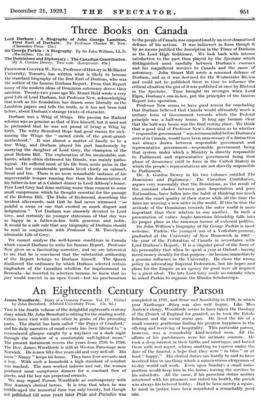Three Books on Canada
Sir George Parkin : A Biography. By Sir John Willison, LL.D. (Macmillan. 12s. 6d.)
PROFESSOR CHESTER W. NEW, Professor of History in McMaster University, Toronto, has written what is likely to become the standard biography of the first Earl of Durham, who was the author of the famous Durham Report. From that Report many of the modern ideas of Dominion autonomy derive their sanction. Twenty-two years ago Mr. Stuart Reid wrote a very good Life of Lord Durham, but Professor New, acknowledging that work as his foundation has drawn more liberally on the Lambton papers and tells the truth, as it has not been told before, about Durham's strange twists of character.
Durham was a Whig of Whigs. His passion for Radical reforms was as genuine as that of Fox himself, but it need not be pretended that he was not proud of being a Whig by birth. The witty Beresford Hope had good reason for nick- naming the Whigs the " sacred circle of the great-grand- motherhood." It was almost a matter of family to be a true Whig, and Durham played his part handsomely by marrying the daughter of Lord Grey, the champion of the great Reform Bill. The explanation of his incalculable out- bursts, which often distressed his friends, was mainly patho- logical. He suffered most of his life from acute pains in the head and for considerable periods lived chiefly on calomel, bread and tea. There is no more remarkable instance of his ungovernable temper running free than his denunciation of his father-in-law at a Cabinet dinner in Lord Althorp's house. Poor Lord Grey had done nothing worse than consent to some small compromise which he thought essential for the passage of the Reform Bill. The Duke of Richmond, describing the incident afterwards, said that he had never witnessed " so painful a scene or one that excited so much disgust and indignation." Yet Durham was sincerely devoted to Lord Grey, and certainly no younger statesman of that day was so happy in a father-in-law both generous and noble. It would be a safe rule that any biography of Durham should be read in conjunction with Professor G. M. Trevelyan's admirable Life of Grey.
We cannot analyse the well-known conditions in Canada which caused Durham to write his famous Report. Professor New gives us a fascinating narrative, and we are interested to see that he is convinced that the substantial authorship of the Report belongs to Durham himself. The Queen disallowed the ordinance by which Durham selected certain ringleaders of the Canadian rebellion for imprisonment in Bermuda—he resorted to selection because he knew that no jury would convict in an open Court—but his proclamation to the people of Canada was unquestionably an over-dramatized defence of his actions. It was indiscreet in form though it by no means justified the description in the Times of Durham as the Lord High Seditioner. We look back with intense satisfaction to the part then played by the Spectator which distinguished most carefully between Durham's excesses and his magnificent services to Canada and the cause of autonomy. John Stuart Mill wrote a reasoned defence of Durham, and as it was destined for the Westminster Review and could not be published there in time to influence the critical situation the gist of it was published at once by Rintoul in the Spectator. Time brought its revenges when Lord Elgin, Durham's son-in-law, put the principles of the famous Report into operation.
Professor New seems to have good reason for concluding that Durham believed that Canada would ultimately reach a unitary form of Government towards which the Federal principle was a half-way house. It long ago became clear that the half-way house was the final resting place. We think that a good deal of Professor New's discussion as to whether " responsible government " was recommended before Durham's arrival in Canada, would have been unnecessary if a distinction was always drawn between responsible government and representative government—responsible government being that system under which a Ministry is directly responsible to Parliament and representative government being that phase of democracy (still in force in the United States) in which the people's representatives are not directly responsible to Parliament.
Dr. A. Gordon Dewey in his two volumes entitled The Dominions and Diplomacy : The Canadian Contribution, argues very reasonably that the Dominions, as the result of the constant clashes between pure Imperialism and pure Nationalism, have fallen into the habit of thinking too much about the exact quality of their status while all the time the fates are weaving a new order in the world. If this be true the attitude of the Dominions towards the outer world is more important than their relation to one another. In such a presentation of values Anglo-American friendship falls into its proper place as the summum bonum of external politics.
Sir John Willison's biography of Sir George Parkin is most welcome. Parkin, the youngest son of a Yorkshire yeoman, graduated at the University of New Brunswick in 1867— the year of the Federation of Canada in accordance with Lord Durham's Report. It is a singular proof of the force of his personality that when he spent a year at Oxford—having saved money steadily for that purpose—he became immediately a genuine influence in the University. Ile chose the wrong policy in advocating Imperial Federation, but his hopes and plans for the Empire as an agency for good were all inspired by a great ideal. The late Lord Grey made no mistake when he asked Parkin to organize the Rhodes Scholarships.


































 Previous page
Previous page